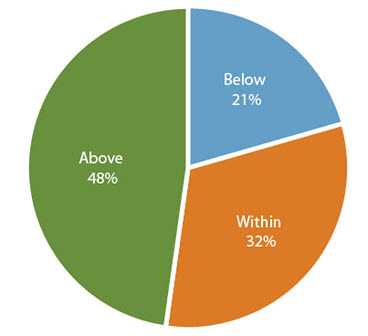Weight Gain During Pregnancy
On this Page
- How Much Weight Should You Gain during Pregnancy?
- Weight Gain Recommendations
- What Percentage of Women Are Within Pregnancy Weight Gain Recommendations?
- Why Is It Important to Gain the Recommended Amount of Weight During Pregnancy?
- What Steps Can You Take to Meet Pregnancy Weight Gain Recommendations?
- Tracking Your Pregnancy Weight Gain
- CDC Activities: Surveillance and Research
The amount of weight you gain during pregnancy is important for the health of your pregnancy and for the long-term health of you and your baby. Learn about pregnancy weight gain recommendations and steps you can take to meet your pregnancy weight gain goal.
How Much Weight Should You Gain during Pregnancy?
How much weight you should gain during pregnancy is based on your body mass index (BMI) before pregnancy. BMI is a measure of body fat calculated from weight and height.
Calculate your BMI and weight category using your weight before you became pregnant:

Weight Gain Recommendations for Women Pregnant With One Baby
| If before pregnancy, you were… | You should gain… |
|---|---|
| Underweight BMI less than 18.5 |
28-40 pounds |
| Normal Weight BMI 18.5-24.9 |
25-35 pounds |
| Overweight BMI 25.0-29.9 |
15-25 pounds |
| Obese BMI greater than or equal to 30.0 |
11- 20 pounds |
Weight Gain Recommendations for Women Pregnant With Twins
| If before pregnancy, you were… | You should gain… |
|---|---|
| Underweight BMI less than 18.5 |
50-62 pounds* |
| Normal Weight BMI 18.5-24.9 |
37-54 pounds |
| Overweight BMI 25.0-29.9 |
31-50 pounds |
| Obese BMI greater than or equal to 30.0 |
25-42 pounds |
For more information, visit Healthy Weight Gain During Pregnancy from the Institute of Medicine. If you’re pregnant with triplets or more, talk to your health care provider about your weight gain goals.
*All recommendations are from the Institute of Medicine, with the exception of underweight women with twins. Source: Luke B, Hediger ML, Nugent C, Newman RB, Mauldin JG, Witter FR, et al. Body mass index-specific weight gains associated with optimal birth weights in twin pregnancies. J Reprod Med. 2003; 48:217–24.
What Percentage of Women Are Within Pregnancy Weight Gain Recommendations?
Recent studies found that only about one-third (32%) of women gained the recommended amount of weight during pregnancy and most women gained weight outside the recommendations (21% too little, 48% too much).
Percentage of Women Below, Within, and Above Pregnancy Weight Gain Recommendations

Source: 2015 National Vital Statistics System birth data. http://www.cdc.gov/nchs/nvss/births.htm.
For more information, please visit http://www.cdc.gov/mmwr/volumes/65/wr/mm6540a10.htm
Why Is It Important to Gain the Recommended Amount of Weight During Pregnancy?
Gaining less than the recommended amount of weight in pregnancy is associated with delivering a baby who is too small. Some babies born too small may have difficulty starting breastfeeding, may be at increased risk for illness, and may experience developmental delays (not meeting the milestones for his or her age).
Gaining more than the recommended amount of weight in pregnancy is associated with having a baby who is born too large, which can lead to delivery complications, cesarean delivery, and obesity during childhood. Gaining more than the recommended amount of weight can also increase the amount of weight you hold on to after pregnancy, which can lead to obesity.
What Steps Can You Take to Meet Pregnancy Weight Gain Recommendations?
- Work with your health care provider on your weight gain goals at the beginning and regularly throughout your pregnancy.
- Track your pregnancy weight gain at the beginning and regularly throughout pregnancy and compare your progress to recommended ranges of healthy weight gain.
- Eat a balanced diet high in whole grains, vegetables, fruits, low fat dairy, and lean protein. Use the MyPlate daily checklist to see the daily food group targets that are right for you at your stage of pregnancy. Most foods are safe to eat during pregnancy, but you will need to use caution with or avoid certain foods. Talk with your health care provider or visit Checklist of Foods to Avoid During Pregnancy for more information about food safety in pregnancy.
- Limit added sugars and solid fats found in foods like soft drinks, desserts, fried foods, whole milk, and fatty meats.
- Know your calorie needs. In general, the first trimester (or first three months) does not require any extra calories. Typically, women need about 340 additional calories per day during the second trimester (second three months) and about 450 additional calories per day during the third (last) trimester.
- Work up to or maintain at least 150 minutes (2 ⅟2 hours) of moderate intensity aerobic activity (such as brisk walking) per week. 150 minutes may sound overwhelming, but you can achieve your goal by breaking up your physical activity into 10 minutes at a time. Physical activity is healthy and safe for most pregnant women. Talk to your health care provider to determine if you have any physical activity restrictions. Visit Physical Activity for Healthy Pregnant or Postpartum Women for more information.
Tracking Your Pregnancy Weight Gain
CDC Activities: Surveillance and Research
CDC conducts surveillance using data from the Pregnancy Risk Assessment Monitoring System, the National Vital Statistics System, and other sources to monitor the prevalence and trends of women meeting pregnancy weight gain recommendations. CDC also conducts research to understand health risks associated with too much or too little weight gain during pregnancy to inform future pregnancy weight gain guidelines. Current activities include examining the quality of prepregnancy weight and pregnancy weight gain data, the role of provider advice in helping women to meet pregnancy weight gain recommendations, as well as identifying strategies that can help women achieve pregnancy weight gain within recommendations.
Below you will find titles of recent publications related to weight gain during pregnancy authored by staff in CDC's Division of Reproductive Health. We recommend that you review abstracts of our reports and other publications by using the resources of the National Library of Medicine's PubMed service.
- Gestational Weight Gain - United States, 2012 and 2013.
- Prevalence and characteristics associated with gestational weight gain adequacy.
- Associations of Gestational Weight Gain with Preterm Birth among Underweight and Normal Weight Women.
- Trends in gestational weight gain: the Pregnancy Risk Assessment Monitoring System, 2000-2009.
- Maternal Prepregnancy Body Mass Index and Child Psychosocial Development at 6 Years of Age.
- Healthiest Weight: A Life Course Approach. Obesity—Before, During, and Beyond Pregnancy.
- Association of maternal body mass index, excessive weight gain, and gestational diabetes mellitus with large-for-gestational-age births.
- Pregnancy and Postpartum Related Weight Counseling Practices of U.S. Obstetrician-Gynecologists: Results from the Doc Styles Survey, 2010.
- Curbside Consultation in Pediatric Obesity. How does the mother’s nutritional status during pregnancy contribute to or prevent the development of obesity?
- Reliability of gestational weight gain reported postpartum: a comparison to the birth certificate.
- Excess gestational weight gain is associated with child adiposity among mothers with normal and overweight prepregnancy weight status.
- Associations Between Maternal Prepregnancy Body Mass Index and Child Neurodevelopment at 2 Years of Age.
- Newborn size among obese women with weight gain outside the 2009 Institute of Medicine recommendation.
- Page last reviewed: October 14, 2016
- Page last updated: October 14, 2016
- Content source:


 ShareCompartir
ShareCompartir